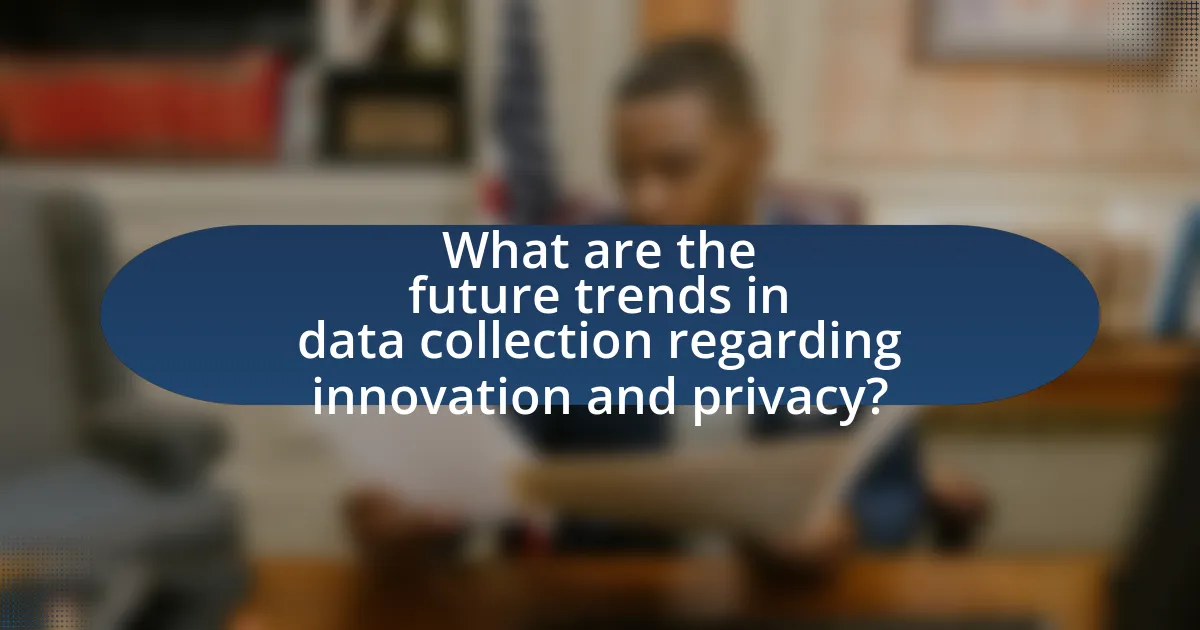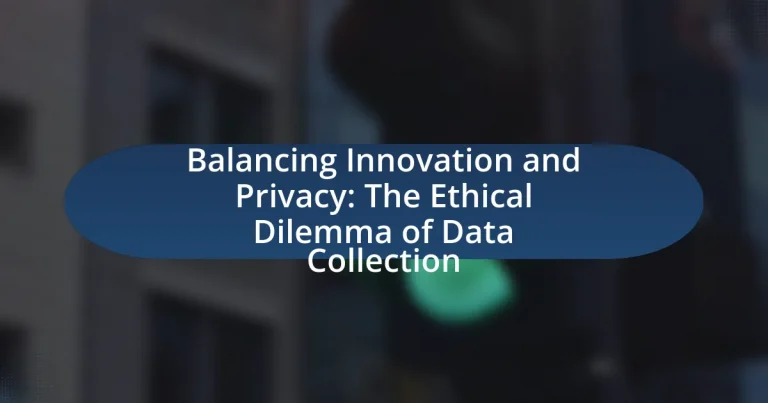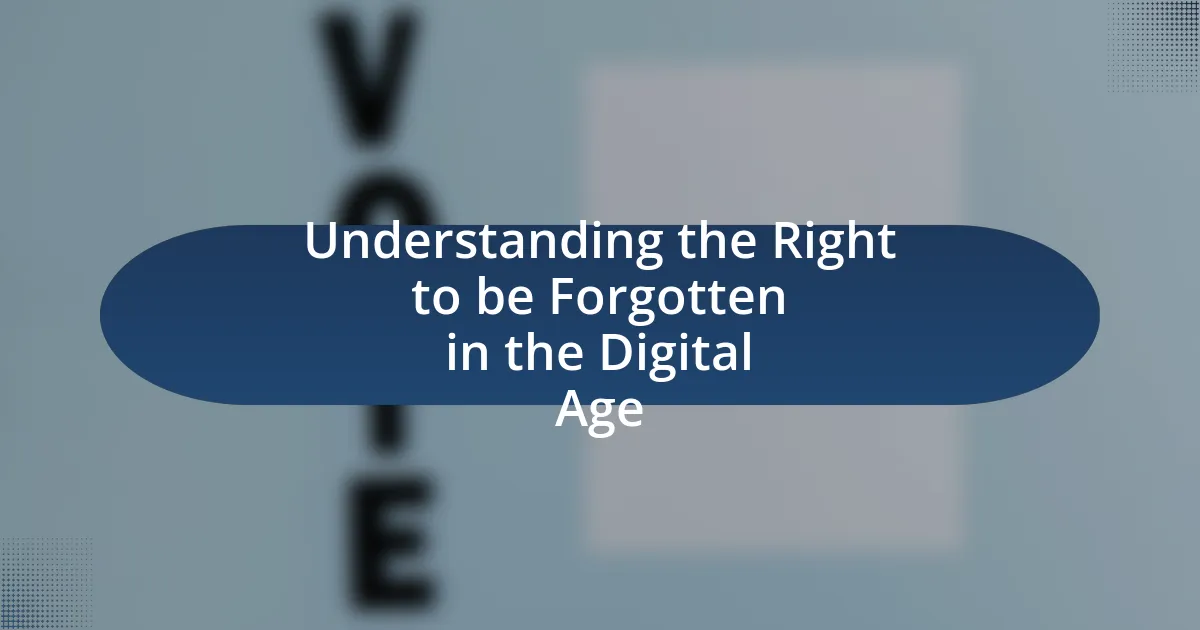The article examines the ethical dilemma of data collection, focusing on the tension between innovation and privacy. It highlights how organizations leverage personal data to drive advancements across various sectors, such as healthcare and retail, while also addressing significant privacy concerns, including unauthorized access and data breaches. Key topics include the types of data collected, the impact of data breaches on consumer trust, and the importance of balancing innovation with privacy through ethical practices and regulatory compliance. The article also discusses emerging technologies and strategies organizations can adopt to ensure responsible data collection while fostering consumer trust.

What is the ethical dilemma of data collection in the context of innovation and privacy?
The ethical dilemma of data collection in the context of innovation and privacy revolves around the conflict between leveraging personal data for technological advancement and safeguarding individual privacy rights. Organizations often collect vast amounts of personal information to drive innovation, enhance user experiences, and improve services. However, this practice raises significant concerns regarding consent, data security, and the potential for misuse of sensitive information. For instance, a 2020 study by the Pew Research Center found that 81% of Americans feel that the potential risks of companies collecting their data outweigh the benefits, highlighting widespread apprehension about privacy violations. This tension between the pursuit of innovation and the imperative to protect personal privacy creates a complex ethical landscape that requires careful consideration and regulation.
How does data collection drive innovation in various sectors?
Data collection drives innovation in various sectors by enabling organizations to analyze trends, improve decision-making, and enhance customer experiences. For instance, in healthcare, data collection allows for the identification of disease patterns and the development of personalized treatment plans, leading to improved patient outcomes. According to a report by McKinsey, healthcare organizations that leverage data analytics can achieve a 15-20% reduction in costs while improving care quality. In retail, companies utilize customer data to optimize inventory management and tailor marketing strategies, resulting in increased sales and customer satisfaction. A study by Deloitte found that data-driven companies are 23 times more likely to acquire customers and 6 times more likely to retain them. Thus, effective data collection not only fosters innovation but also drives efficiency and competitiveness across sectors.
What types of data are commonly collected for innovation purposes?
Data commonly collected for innovation purposes includes customer feedback, market trends, usage statistics, and competitive analysis. Customer feedback provides insights into user preferences and pain points, which can guide product development. Market trends help organizations identify emerging opportunities and shifts in consumer behavior. Usage statistics reveal how products or services are utilized, informing enhancements and new features. Competitive analysis offers a benchmark against industry standards, enabling companies to innovate effectively. Collectively, these data types facilitate informed decision-making and strategic planning in innovation processes.
How do companies utilize collected data to enhance their products and services?
Companies utilize collected data to enhance their products and services by analyzing customer behavior, preferences, and feedback to inform product development and improve user experience. For instance, data analytics allows companies to identify trends and patterns, enabling them to tailor offerings to meet specific customer needs. A study by McKinsey & Company found that data-driven organizations are 23 times more likely to acquire customers, 6 times more likely to retain customers, and 19 times more likely to be profitable. This demonstrates that effective use of data not only enhances product features but also drives business growth and customer satisfaction.
What privacy concerns arise from data collection practices?
Data collection practices raise significant privacy concerns, primarily related to unauthorized access to personal information and potential misuse of data. Individuals often lack awareness of how their data is collected, stored, and utilized, leading to a breach of trust. For instance, a 2020 survey by the Pew Research Center found that 79% of Americans are concerned about how their data is being used by companies. Additionally, data breaches can expose sensitive information, resulting in identity theft and financial loss. The Cambridge Analytica scandal exemplifies the risks associated with data misuse, where personal data from millions of Facebook users was harvested without consent for political advertising. These examples illustrate the critical need for robust data protection measures to address privacy concerns arising from data collection practices.
What are the potential risks to individual privacy from data collection?
The potential risks to individual privacy from data collection include unauthorized access to personal information, data breaches, and misuse of data by third parties. Unauthorized access can occur when sensitive data is inadequately protected, leading to identity theft or fraud. Data breaches have become increasingly common; for instance, the 2017 Equifax breach exposed the personal information of approximately 147 million people, highlighting vulnerabilities in data security. Additionally, third parties may misuse collected data for targeted advertising or surveillance without individuals’ consent, raising ethical concerns about privacy rights. These risks underscore the need for robust data protection measures and ethical guidelines in data collection practices.
How do data breaches impact consumer trust and privacy perceptions?
Data breaches significantly diminish consumer trust and alter privacy perceptions. When organizations experience data breaches, consumers often feel vulnerable and question the security measures in place to protect their personal information. According to a 2020 study by IBM, 80% of consumers stated they would stop doing business with a company that experienced a data breach. This decline in trust can lead to long-term reputational damage for the affected organizations, as consumers become more cautious about sharing their data. Furthermore, the perception of privacy is negatively impacted, with individuals increasingly concerned about how their information is collected, stored, and used. A survey by the Pew Research Center found that 79% of Americans are concerned about how their data is being used by companies, highlighting the lasting effects of data breaches on consumer attitudes toward privacy.
Why is balancing innovation and privacy crucial in today’s digital landscape?
Balancing innovation and privacy is crucial in today’s digital landscape because it ensures that technological advancements do not compromise individual rights and data security. As companies increasingly rely on data-driven strategies to enhance user experiences and drive growth, the risk of privacy violations escalates, leading to potential legal repercussions and loss of consumer trust. For instance, a 2021 survey by the Pew Research Center found that 81% of Americans feel that the potential risks of companies collecting their personal data outweigh the benefits. This highlights the necessity for organizations to adopt ethical data practices that foster innovation while safeguarding user privacy, thereby maintaining a sustainable relationship with consumers and complying with regulations like the General Data Protection Regulation (GDPR).
What are the implications of failing to balance these two aspects?
Failing to balance innovation and privacy in data collection can lead to significant ethical and legal repercussions. When organizations prioritize innovation without adequate privacy measures, they risk violating data protection regulations, such as the General Data Protection Regulation (GDPR), which can result in hefty fines and legal actions. Additionally, a lack of privacy can erode consumer trust, leading to decreased user engagement and potential loss of business. Research indicates that 79% of consumers are concerned about how their data is used, highlighting the importance of maintaining a balance to foster trust and compliance.
How can organizations ensure ethical data collection practices?
Organizations can ensure ethical data collection practices by implementing transparent consent processes and adhering to data protection regulations. Transparency involves clearly informing individuals about what data is being collected, how it will be used, and obtaining explicit consent before collection. Adhering to regulations such as the General Data Protection Regulation (GDPR) mandates that organizations must respect individuals’ rights to privacy and data protection, which includes providing access to their data and the ability to withdraw consent. Studies show that organizations that prioritize ethical data practices not only comply with legal standards but also build trust with consumers, leading to better customer relationships and loyalty.
How do regulations influence the balance between innovation and privacy?
Regulations influence the balance between innovation and privacy by establishing legal frameworks that dictate how personal data can be collected, used, and shared. These regulations, such as the General Data Protection Regulation (GDPR) in Europe, impose strict guidelines on data handling, which can limit the scope of innovative technologies that rely on extensive data collection. For instance, GDPR requires explicit consent from users before their data can be processed, which can slow down the development of data-driven innovations. Conversely, regulations can also foster innovation by creating a trustworthy environment for consumers, encouraging companies to develop new technologies that prioritize privacy, such as privacy-preserving data analytics. This dual effect illustrates that while regulations may impose constraints, they can also drive the creation of innovative solutions that respect user privacy.
What role do consumers play in shaping data collection practices?
Consumers play a crucial role in shaping data collection practices by influencing companies’ policies through their preferences and behaviors. As consumers increasingly demand transparency and control over their personal information, businesses are compelled to adopt more ethical data collection methods. For instance, surveys indicate that 79% of consumers are concerned about how their data is used, prompting companies to implement stricter privacy measures and clearer consent protocols. This shift not only reflects consumer expectations but also drives regulatory changes, as seen with the introduction of laws like the General Data Protection Regulation (GDPR) in Europe, which was largely influenced by consumer advocacy for privacy rights.

What strategies can organizations adopt to balance innovation and privacy?
Organizations can adopt several strategies to balance innovation and privacy, including implementing robust data governance frameworks, utilizing privacy-by-design principles, and fostering a culture of transparency. A robust data governance framework ensures that data collection and usage comply with legal standards, such as the General Data Protection Regulation (GDPR), which mandates strict data handling practices. Privacy-by-design principles integrate privacy considerations into the development of new technologies and processes from the outset, thereby minimizing risks associated with data breaches. Additionally, fostering a culture of transparency involves openly communicating data practices to stakeholders, which builds trust and encourages responsible innovation. These strategies collectively enable organizations to innovate while safeguarding individual privacy rights.
How can companies implement ethical data collection methods?
Companies can implement ethical data collection methods by prioritizing transparency, obtaining informed consent, and ensuring data minimization. Transparency involves clearly communicating to users what data is being collected, how it will be used, and who it will be shared with. Informed consent requires companies to obtain explicit permission from users before collecting their data, allowing individuals to make informed choices about their privacy. Data minimization means collecting only the data necessary for a specific purpose, reducing the risk of misuse. According to a 2020 report by the International Association of Privacy Professionals, organizations that adopt these practices not only comply with regulations like GDPR but also build trust with consumers, leading to better customer relationships and loyalty.
What frameworks exist for ethical data governance?
Several frameworks exist for ethical data governance, including the General Data Protection Regulation (GDPR), the Fair Information Practices (FIPs), and the Data Ethics Framework by the UK Government. The GDPR establishes strict guidelines for data protection and privacy in the European Union, emphasizing user consent and data minimization. The FIPs provide a set of principles aimed at ensuring fair and responsible data handling, including transparency, purpose limitation, and accountability. The UK Government’s Data Ethics Framework offers guidance for public sector organizations on how to use data responsibly, focusing on ethical considerations in data collection and usage. These frameworks collectively aim to balance innovation with privacy, ensuring that data governance practices uphold ethical standards.
How can transparency in data practices enhance consumer trust?
Transparency in data practices enhances consumer trust by allowing individuals to understand how their data is collected, used, and protected. When companies openly share their data handling processes, consumers feel more secure and informed, which fosters a sense of reliability. Research indicates that 81% of consumers feel they have little control over their personal data, and transparency can mitigate this concern by empowering them with knowledge. Furthermore, organizations that adopt transparent data practices often experience increased customer loyalty and satisfaction, as evidenced by a study from the Pew Research Center, which found that 79% of consumers are concerned about how their data is used and prefer businesses that prioritize transparency.
What technologies can help protect privacy while fostering innovation?
Technologies that can help protect privacy while fostering innovation include encryption, differential privacy, and blockchain. Encryption secures data by converting it into a format that can only be read by authorized users, thus protecting sensitive information while allowing for secure data sharing and collaboration. Differential privacy adds noise to datasets, enabling organizations to analyze trends without exposing individual data points, which encourages innovation in data analysis while safeguarding personal information. Blockchain technology provides a decentralized ledger that enhances transparency and security, allowing for innovative applications in various sectors while maintaining user privacy through cryptographic techniques. These technologies collectively enable organizations to innovate responsibly while prioritizing user privacy.
How do encryption and anonymization techniques work in data protection?
Encryption and anonymization techniques work in data protection by transforming sensitive information into formats that prevent unauthorized access and identification. Encryption uses algorithms to convert data into ciphertext, making it unreadable without a decryption key, thus safeguarding data during storage and transmission. For example, the Advanced Encryption Standard (AES) is widely used to secure sensitive data in various applications, ensuring that even if data is intercepted, it remains protected.
Anonymization, on the other hand, involves removing or altering personally identifiable information (PII) from datasets, rendering individuals unidentifiable. Techniques such as data masking and aggregation are employed to achieve this, allowing organizations to analyze data without compromising individual privacy. A study by the National Institute of Standards and Technology (NIST) highlights that effective anonymization can significantly reduce the risk of re-identification, thereby enhancing data protection.
Together, these techniques form a critical part of data protection strategies, ensuring compliance with regulations like the General Data Protection Regulation (GDPR) and fostering trust in data handling practices.
What role does artificial intelligence play in balancing these concerns?
Artificial intelligence plays a crucial role in balancing innovation and privacy concerns by enabling organizations to analyze large datasets while implementing privacy-preserving techniques. AI technologies, such as differential privacy and federated learning, allow for the extraction of insights from data without compromising individual privacy. For instance, differential privacy adds noise to datasets, ensuring that the output does not reveal information about any specific individual, thus protecting user identities while still allowing for valuable data analysis. This dual capability of AI fosters innovation in data-driven applications while adhering to ethical standards of privacy, demonstrating its effectiveness in addressing the ethical dilemma of data collection.

What are the future trends in data collection regarding innovation and privacy?
Future trends in data collection will increasingly focus on enhancing user privacy while fostering innovation through advanced technologies. The integration of privacy-preserving techniques, such as differential privacy and federated learning, allows organizations to analyze data without compromising individual identities. For instance, a study by the MIT Media Lab highlights that these methods can enable companies to gain insights from user data while ensuring compliance with regulations like GDPR. Additionally, the rise of consumer awareness regarding data privacy is prompting businesses to adopt transparent data practices, which can lead to greater trust and engagement. As a result, the future landscape of data collection will likely prioritize ethical considerations alongside technological advancements, balancing the need for innovation with the imperative of protecting user privacy.
How is consumer awareness influencing data collection practices?
Consumer awareness is significantly influencing data collection practices by driving companies to adopt more transparent and ethical approaches. As consumers become increasingly informed about their data rights and privacy concerns, businesses are compelled to implement stricter data protection measures and clearer consent protocols. For instance, the introduction of regulations like the General Data Protection Regulation (GDPR) in Europe has been a direct response to heightened consumer awareness, mandating organizations to obtain explicit consent before collecting personal data. This shift not only enhances consumer trust but also encourages companies to innovate in ways that prioritize user privacy, ultimately reshaping the landscape of data collection practices.
What are the emerging technologies that may impact data privacy?
Emerging technologies that may impact data privacy include artificial intelligence (AI), blockchain, the Internet of Things (IoT), and quantum computing. AI can analyze vast amounts of personal data, raising concerns about surveillance and consent. Blockchain offers decentralized data storage, which can enhance privacy but also poses challenges in data accessibility and regulation. The IoT connects numerous devices, increasing the potential for data breaches and unauthorized access to personal information. Quantum computing has the potential to break current encryption methods, threatening the security of sensitive data. These technologies are reshaping the landscape of data privacy, necessitating new frameworks for protection and regulation.
How are companies adapting to changing consumer expectations around privacy?
Companies are adapting to changing consumer expectations around privacy by implementing stricter data protection measures and enhancing transparency in their data practices. For instance, many organizations are adopting privacy-by-design principles, which integrate privacy considerations into the development of products and services from the outset. Additionally, companies are increasingly providing clear privacy policies and user-friendly consent mechanisms, allowing consumers to understand how their data is collected and used. According to a 2022 survey by the International Association of Privacy Professionals, 70% of consumers expressed a preference for companies that prioritize data privacy, indicating a significant shift in consumer expectations. This trend has prompted businesses to invest in privacy compliance technologies and to appoint Chief Privacy Officers to oversee data governance, ensuring alignment with regulations such as the General Data Protection Regulation (GDPR) and the California Consumer Privacy Act (CCPA).
What best practices should organizations follow to navigate this dilemma?
Organizations should implement a transparent data collection policy to navigate the ethical dilemma of balancing innovation and privacy. This involves clearly communicating to users what data is being collected, how it will be used, and obtaining informed consent. Research indicates that 79% of consumers are concerned about how their data is being used, highlighting the importance of trust in data practices. Additionally, organizations should adopt data minimization principles, collecting only the data necessary for their purposes, which aligns with regulations like the General Data Protection Regulation (GDPR). By prioritizing user privacy and adhering to legal standards, organizations can foster trust while still pursuing innovative solutions.
How can organizations create a culture of privacy awareness among employees?
Organizations can create a culture of privacy awareness among employees by implementing comprehensive training programs focused on data protection and privacy policies. These training sessions should be mandatory and regularly updated to reflect current regulations and best practices, ensuring that employees understand the importance of privacy in their daily operations. For instance, a study by the International Association of Privacy Professionals found that organizations with regular privacy training saw a 30% reduction in data breaches. Additionally, fostering an open environment where employees feel comfortable discussing privacy concerns and reporting potential issues can further enhance awareness. By integrating privacy into the organizational culture, companies not only comply with legal requirements but also build trust with employees and customers alike.
What steps can consumers take to protect their privacy in a data-driven world?
Consumers can protect their privacy in a data-driven world by implementing several key strategies. First, they should regularly review and adjust privacy settings on social media and online accounts to limit data sharing. According to a 2021 Pew Research Center survey, 81% of Americans feel they have little to no control over the data collected about them, highlighting the importance of proactive management of privacy settings.
Second, consumers should utilize strong, unique passwords and enable two-factor authentication on their accounts to enhance security. The National Institute of Standards and Technology (NIST) recommends these practices as essential for safeguarding personal information against unauthorized access.
Third, consumers can use privacy-focused web browsers and search engines that do not track user activity, such as DuckDuckGo. Research indicates that using such tools can significantly reduce the amount of personal data collected by advertisers.
Lastly, consumers should be cautious about sharing personal information and be aware of phishing scams. The Federal Trade Commission (FTC) reports that identity theft and fraud are prevalent, emphasizing the need for vigilance in protecting personal data. By adopting these measures, consumers can effectively safeguard their privacy in an increasingly data-driven environment.





